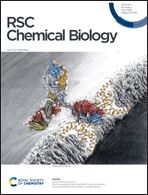
RSC Chemical Biology
Scope & Guideline
Advancing Interdisciplinary Discoveries in Life Sciences
Introduction
Aims and Scopes
- Chemical Probes and Molecular Tools:
The journal publishes research on the design, synthesis, and application of chemical probes that enable the study of biological processes, including protein-protein interactions, post-translational modifications, and enzyme activities. - Biosynthesis and Natural Products:
A significant focus is on the chemical biology of natural products, including biosynthetic pathways and the engineering of natural products for therapeutic applications. - RNA and Nucleic Acid Chemistry:
Research related to RNA chemistry, including the development of nucleic acid analogs and their applications in therapeutics and diagnostics, is a core area of interest. - Bioconjugation and Drug Development:
The journal covers innovative bioconjugation strategies for drug development, including the use of peptides and small molecules to enhance therapeutic efficacy and targeting. - Chemical Biology of Metals:
The exploration of metal interactions in biological systems, including metalloproteins and metal-based therapeutics, is a unique contribution of the journal. - Synthetic Biology and Genetic Engineering:
RSC Chemical Biology publishes articles that delve into synthetic biology techniques and genetic engineering, particularly those that utilize chemical biology tools to manipulate biological systems.
Trending and Emerging
- Bioorthogonal Chemistry:
There is an increasing emphasis on bioorthogonal reactions that allow for selective labeling and modification of biomolecules in living systems, facilitating advancements in imaging and therapeutic applications. - Precision Medicine and Targeted Therapies:
Research focusing on precision medicine, including the development of targeted therapies utilizing small molecules and peptides, is on the rise, reflecting a broader trend in the biomedical field. - Machine Learning and Computational Approaches:
The integration of machine learning and computational methods in chemical biology research is becoming prevalent, particularly in predicting protein-ligand interactions and optimizing drug design. - Synthetic Biology Innovations:
Emerging methodologies in synthetic biology, including the engineering of biosynthetic pathways and the design of novel biomolecules, are gaining popularity as researchers seek to create new therapeutic agents. - Metabolomics and Proteomics:
There is a growing interest in the application of metabolomics and proteomics technologies to understand complex biological systems and disease mechanisms, emphasizing the need for comprehensive biological profiling.
Declining or Waning
- Traditional Organic Synthesis:
Research solely focused on traditional organic synthesis techniques without direct application to biological questions appears to be waning in favor of more integrated approaches that combine chemical synthesis with biological insights. - Basic Enzyme Mechanism Studies:
While enzyme mechanisms remain relevant, studies that do not explore the broader implications or applications of these mechanisms in biological contexts are less frequently published. - Single Target Drug Discovery:
There is a noticeable decline in studies focusing exclusively on single-target drug discovery approaches; researchers seem to be shifting towards multi-target and systems biology approaches. - Classical Biochemical Assays:
The reliance on classical biochemical assays without innovative adaptations or integration with modern technologies (such as molecular imaging or high-throughput screening) is becoming less common. - In vitro Models with Limited Biological Relevance:
Research utilizing in vitro models that do not adequately mimic in vivo conditions is declining, as there is a growing emphasis on studies that offer greater translational relevance.
Similar Journals
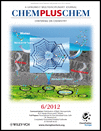
ChemPlusChem
Pioneering Interdisciplinary Research in ChemistryChemPlusChem is a premier journal published by WILEY-V C H VERLAG GMBH, dedicated to the vibrant field of chemistry. With an ISSN of 2192-6506 and an impressive Q1 ranking in Scopus's 2023 category for miscellaneous chemistry, this journal serves as a significant platform for the dissemination of high-quality research and innovative findings. Since its inception in 2012, ChemPlusChem has fostered interdisciplinary collaborations, encapsulating a wide array of topics within chemistry that facilitate scientific advancement and education. The journal features a robust open access system, enabling extensive visibility for authors while providing easy-to-access resources for researchers, professionals, and students globally. Located in Weinheim, Germany, ChemPlusChem reflects international standards and ambitions, striving to enrich the global scientific community through rigorous research and engaging scientific discourse.
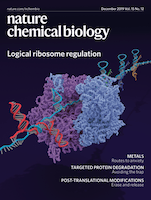
Nature Chemical Biology
Connecting Chemistry and Biology for Groundbreaking Discoveries.Nature Chemical Biology is a prestigious academic journal published by NATURE PORTFOLIO, specializing in the interdisciplinary field of chemical biology. With an impressive impact factor and consistently ranked in the Q1 category for both Cell Biology and Molecular Biology, this journal serves as a vital platform for disseminating groundbreaking research and innovative methodologies. Covering a broad spectrum of topics that integrate the principles of chemistry and biology, it is particularly essential for researchers and professionals dedicated to understanding the molecular mechanisms of life. The journal is renowned for its rigorous peer-review process and high visibility, which contribute to its ranking of 14th in Molecular Biology and 17th in Cell Biology according to Scopus, placing it in the top percentiles of its fields. While open access options are limited, the journal remains a critical resource for students and academics striving to stay at the forefront of chemical biology research, from its inception in 2005 through to its convergence in 2024. By facilitating the exchange of knowledge and ideas, Nature Chemical Biology continues to shape the future of science and innovation.

JACS Au
Exploring the future of chemistry, one article at a time.JACS Au, published by the American Chemical Society, is a premier open access journal dedicated to advancing research in the rapidly evolving fields of analytical chemistry, organic chemistry, and theoretical chemistry. Since its inception in 2021, JACS Au has quickly established itself as a leading platform for high-quality research, reflected in its Q1 rankings across multiple categories for 2023, including Organic Chemistry and Analytical Chemistry. The journal focuses on innovative methodologies and applications that drive the discipline forward, making it an essential resource for researchers, professionals, and students alike. With an impressive Scopus ranking, consistently placing in the top tiers of its categories, and offering a broad range of access options for its readership, JACS Au aims to foster collaboration and disseminate transformative ideas that impact the global scientific community. Exploring diverse topics within chemistry, this journal provides a vital conduit for sharing groundbreaking research and enhancing scientific dialogue.

Chemical Biology Letters
Pioneering Research for a Healthier TomorrowChemical Biology Letters is a prominent academic journal dedicated to the evolving field of biochemistry and its applications in medical and clinical contexts. Published by ScienceIn Publications, this journal serves as a vital platform for researchers, professionals, and students alike, showcasing cutting-edge findings and innovations that drive forward our understanding of chemical interactions in biological systems. With its scope ranging from molecular biology to clinical biochemistry, Chemical Biology Letters is committed to advancing knowledge and fostering collaboration within the scientific community. Recognized for its quality, the journal is categorized in Q4 for Biochemistry and Molecular Biology fields, while achieving notably higher ranks in Medical Biochemistry, reflecting its significant contributions to the discipline. Aiming to remain accessible to a diverse audience, the journal is published in open access format, inviting researchers worldwide to explore and share invaluable insights. Established in 2014, it continues to grow in impact and relevance, paving the way for advancements in both theoretical and applied research within the realm of chemical biology.
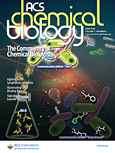
ACS Chemical Biology
Advancing the Frontiers of Chemical BiologyACS Chemical Biology is a premier journal published by the American Chemical Society, dedicated to advancing the understanding of the chemical underpinnings of biological systems. With an ISSN of 1554-8929 and a distinguished track record since its inception in 2006, this journal provides a vital platform for the dissemination of high-quality research in the realms of biochemistry and molecular medicine, achieving a prestigious Q1 ranking in these categories as of 2023. In an era where interdisciplinary approaches are crucial, ACS Chemical Biology fosters collaboration among chemists and biologists, reflecting a steadfast commitment to exploring the chemical processes that govern life. Although it does not operate under an open-access model, the journal maintains a rigorous peer-review process, ensuring the publication of influential studies that shape the future of chemical biology. With an increasing impact factor and a focus on innovative research, ACS Chemical Biology remains an authoritative resource for researchers, professionals, and students eager to engage with cutting-edge findings in this dynamic field.
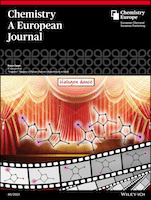
CHEMISTRY-A EUROPEAN JOURNAL
Leading the Charge in European Chemical ScienceCHEMISTRY-A EUROPEAN JOURNAL is a premier academic journal published by WILEY-V C H VERLAG GMBH, specializing in the diverse fields of chemistry and catalysis, with a distinguished focus on organic chemistry. Since its inception in 1995, the journal has established itself as an authoritative resource for researchers and professionals, currently classified in Q1 in Chemistry (miscellaneous) and Organic Chemistry, reflecting its high-quality contributions to the scientific community. With an impressive impact factor and robust Scopus rankings—#33 in Organic Chemistry and #26 in Catalysis—this journal serves as a vital platform for disseminating innovative research findings and critical advancements in chemical sciences. Although not an open-access journal, it provides valuable access options for institutions, ensuring wide reach and engagement within the scientific community. As it converges into 2024, CHEMISTRY-A EUROPEAN JOURNAL remains a key resource for anyone dedicated to advancing the frontiers of chemistry research.
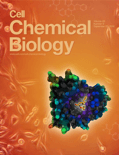
Cell Chemical Biology
Unlocking Innovations in Life Sciences.Cell Chemical Biology, published by Cell Press, stands at the forefront of interdisciplinary research in the realms of biochemistry, molecular biology, and pharmacology. With a robust impact factor evident in its prestigious Q1 quartile rankings across multiple categories including Clinical Biochemistry and Drug Discovery for 2023, this journal serves as a critical platform for disseminating cutting-edge scientific discoveries. As an Open Access publication, it ensures that vital research is accessible to a wide audience, fostering collaborations and driving innovation in the life sciences. Based in the United States, and featuring publications from 2016 to 2024, Cell Chemical Biology invites researchers, professionals, and students alike to contribute to its mission of advancing knowledge through rigorous peer-reviewed articles that address both fundamental and applied aspects of chemical biology.

RUSSIAN JOURNAL OF BIOORGANIC CHEMISTRY
Connecting Organic Chemistry with Biological BreakthroughsRussian Journal of Bioorganic Chemistry (ISSN: 1068-1620, E-ISSN: 1608-330X), published by MAIK Nauka/Interperiodica/Springer, serves as a vital resource for researchers and professionals in the fields of bioorganic chemistry, biochemistry, and organic chemistry. With a focus on the integration of organic chemistry principles with biological processes, this journal aims to disseminate significant findings and advancements from both theoretical and practical perspectives. Although currently not open access, the journal retains a dedication to high-quality, peer-reviewed content, contributing to its reputation within the academic community. The 2023 Scopus rankings position it within the Q4 category for both biochemistry and organic chemistry, indicating its critical niche within these disciplines amid a competitive landscape. Since its inception in 1996, the journal has continued to evolve, providing enriching insights and fostering collaborations among scholars and practitioners alike, with publication converging up to the year 2024. By exploring complex biomolecular interactions and the synthesis of biologically relevant compounds, the Russian Journal of Bioorganic Chemistry remains a significant platform for advancing knowledge and innovation in the life sciences.
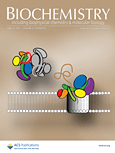
BIOCHEMISTRY
Advancing biochemical knowledge for a deeper understanding of life.BIOCHEMISTRY is a premier academic journal published by the American Chemical Society, dedicated to advancing the field of biochemistry through the dissemination of high-quality research. With an ISSN of 0006-2960 and an e-ISSN of 1520-4995, this esteemed publication has been a vital resource since its inception in 1962 and continues to contribute to the scientific community, boasting a remarkable Q1 ranking in the field as of 2023. The journal's well-curated content emphasizes fundamental biochemical research, molecular genetics, and innovations in biochemical techniques, catering to a diverse audience of researchers, professionals, and students. Although not an open-access publication, BIOCHEMISTRY plays a crucial role in facilitating knowledge exchange and fostering academic collaboration globally, making significant contributions to the understanding of the biochemical processes that underpin life.

Mini-Reviews in Organic Chemistry
Advancing Knowledge through Concise Reviews.Mini-Reviews in Organic Chemistry, published by Bentham Science Publishers, is an esteemed journal in the field of organic chemistry, dedicated to presenting concise, thoughtful reviews that encapsulate the rapid advancements in this dynamic area of study. Since its inception in 2005, the journal has become a valuable resource for researchers, professionals, and students interested in the latest developments and trends, featuring an HIndex indicative of its scholarly impact. With its 2023 Scopus ranking placing it in the 52nd percentile and categorized as Q3 in Organic Chemistry, it offers insights that bridge the gap between fundamental research and practical applications. While not an open-access journal, it provides significant access options for institutional journals and library systems. Situated in the United Arab Emirates, Mini-Reviews in Organic Chemistry continues to serve as a beacon for innovation and knowledge dissemination in organic chemistry, ensuring that its audience remains at the forefront of scientific discovery.